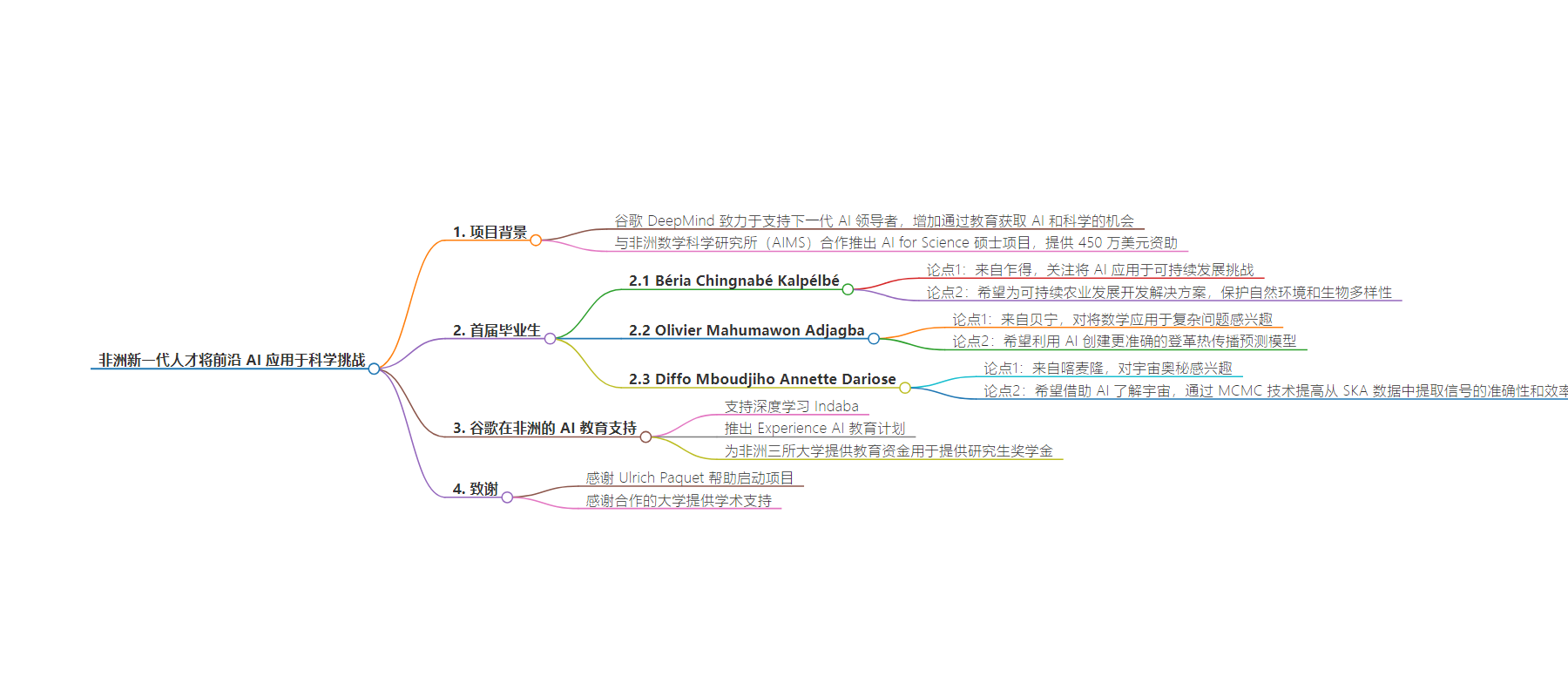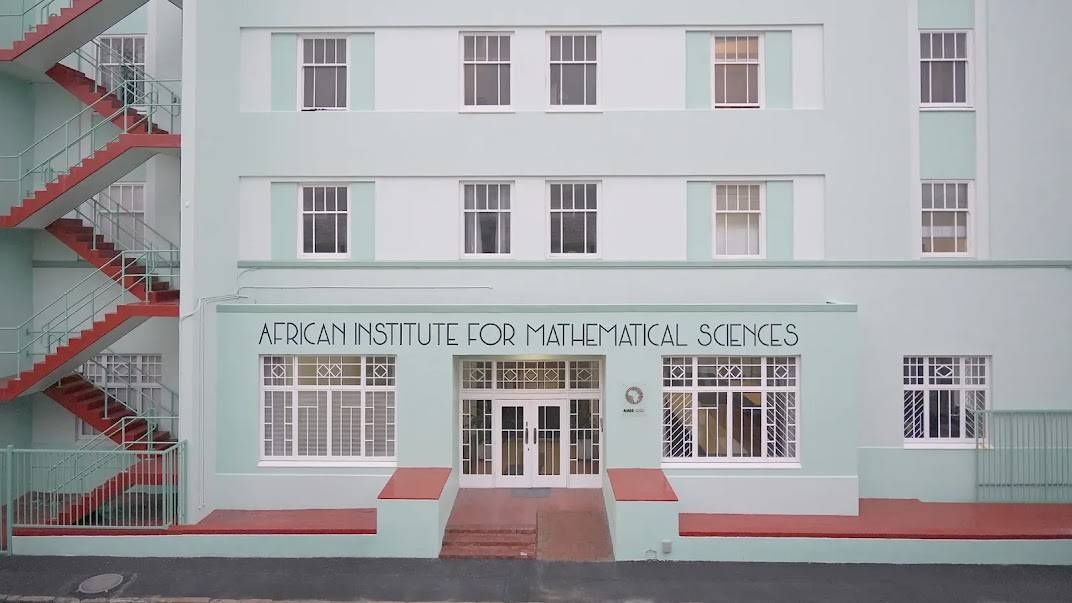包阅导读总结
1. 关键词:
– 非洲人才
– 人工智能
– 科学挑战
– 教育合作
– 成果应用
2. 总结:
谷歌 DeepMind 与非洲数学科学研究所合作推出 AI 科学硕士项目,首届学生毕业。来自不同地区的学生分享了将 AI 应用于可持续发展、病毒传播研究和宇宙探索等领域的志向,此工作基于谷歌在该地区的既有投入,旨在构建更包容的 AI 生态。
3. 主要内容:
– 谷歌 DeepMind 致力于支持全球 AI 社区发展,包括通过教育增加 AI 和科学的获取途径
– 与非洲数学科学研究所合作推出 AI 科学硕士项目,提供奖学金、设备和计算资源
– 首届学生毕业,如来自乍得的 Béria 关注可持续农业,来自贝宁的 Olivier 研究登革热传播预测,来自喀麦隆的 Diffo 探索宇宙
– 该工作基于谷歌在非洲的其他投入,如支持深度学习活动、推出教育项目和提供教育资金
– 增加 AI 研究领域的代表性,构建更全球和包容的 AI 生态,助力学生为当地和全球做出科学发现
思维导图:
文章来源:deepmind.google
作者:Google DeepMind Blog
发布时间:2024/8/5 12:00
语言:英文
总字数:816字
预计阅读时间:4分钟
评分:80分
标签:人工智能教育,教育合作,谷歌 DeepMind,非洲数学科学研究所,可持续性
以下为原文内容
本内容来源于用户推荐转载,旨在分享知识与观点,如有侵权请联系删除 联系邮箱 media@ilingban.com
Company
A new generation of African talent brings cutting-edge AI to scientific challenges
- Published
- Authors
-
Obum Ekeke OBE, Head of Education Partnerships

Food security, healthcare and exploring the cosmos are among the ways students of a new pan-African Master’s program aspire to apply AI
At Google DeepMind, we’re committed to supporting the next generation of artificial intelligence (AI) leaders to help build a stronger, more diverse and inclusive global AI community. This includes increasing access to AI and science through education.
Last year, we partnered with the African Institute for Mathematical Sciences (AIMS), Africa’s first network of centers of excellence in mathematical sciences, to launch an AI for Science Master’s program, with a $4.5M grant from Google DeepMind.
This funding helps AIMS provide full scholarships, equipment and compute to talented local students, giving them access to advanced studies in mathematics, AI and machine learning from world-class academics at AIMS South Africa. Students have the opportunity to accelerate scientific discovery, with mentoring and support from Google DeepMind’s researchers and engineers.
This summer, the first cohort of students graduated at a ceremony at the AIMS campus in Cape Town, South Africa. As the next generation of AI leaders in Africa, Béria Chingnabé Kalpélbé, Olivier Mahumawon Adjagba and Diffo Mboudjiho Annette Dariose shared their experiences in pioneering AI research and what they’re hoping to achieve with their work.
Béria Chingnabé Kalpélbé is passionate about applying AI to sustainability challenges.
Béria: Innovating for better food security
Sustainability is a top priority for Béria, originally from Chad. “I hope to develop solutions for sustainable agricultural development that will benefit both people and the planet by integrating principles of renewable energy, precision farming, and ecological preservation in my work,” he says.
“Beyond agriculture, AI offers significant potential to enhance the resilience of Africa’s natural environments,” Béria adds. “By implementing AI-powered monitoring and decision-support systems, we can safeguard Africa’s precious green areas and biodiversity for future generations.”
Olivier Mahumawon Adjagba wants to use AI to create more accurate prediction models for the spread of dengue fever.
Olivier: Pioneering virus transmission research through the lens of climate change
Olivier’s passion for applying mathematics to complex problems led him to AIMS South Africa: “Throughout my academic journey, I’ve been fascinated by the power of mathematics, particularly in addressing real-world challenges through AI,” he says. “A solid foundation in mathematical sciences is crucial for driving progress in areas such as healthcare, climate science and technology — and I’m eager to be at the forefront of these advancements.”
Originally from Benin, Olivier now looks to apply this approach to data from African countries to help understand the spread of dengue fever. “Using advanced AI techniques, I hope to create more accurate prediction models to inform public health strategies and interventions, ultimately contributing to the control and prevention of this viral disease.”
Discussing the personal impact of his scholarship, Olivier recounts, “Without it, pursuing advanced studies at such a prestigious institution would have been financially unattainable for me. This support enabled me to fully immerse myself in AIMS’ rigorous academic environment, so I could engage deeply in coursework, collaborate with professors and peers, and contribute meaningfully to research projects.”
Diffo Mboudjiho Annette Dariose hopes to learn more about our universe with the help of AI.
Diffo: Unraveling the secrets of our universe
Diffo, from Cameroon, is fascinated by the big questions beyond Earth — which is what drew her to the Square Kilometre Array (SKA), the largest and most sensitive radio telescope on the planet.
“Understanding the 21cm line provides insights into the early universe, the formation of the first stars and galaxies, and the structure of the cosmos,” Diffo explains. “By applying Markov chain Monte Carlo (MCMC) techniques, I hope to improve the accuracy and efficiency of extracting these faint signals from SKA data, potentially leading to more precise cosmological models and a deeper understanding of the future evolution of the universe.”
For those considering similar studies, Diffo offers a few words of advice: “Stay curious, be persistent and embrace interdisciplinary learning. Engaging in hands-on projects, collaborating with peers, and seeking mentorship from AI experts can greatly benefit your learning experience and career prospects.”
Supporting AI education in Africa
This work builds on our existing commitments in the region, including our support of the Deep Learning Indaba through volunteering and funding since its inception in 2017, the recent launch of our Experience AI education program across Africa, which has already engaged local educators working with more than 30,000 young people, and additional educational funding, which has been used by three further African universities to offer a total of over 40 postgraduate scholarships since 2020.
Increasing representation in the field of AI research offers a much-needed opportunity to bring diverse values, perspectives, and concerns into conversations about the design and deployment of this transformative technology. We hope our support for AIMS not only serves to build a more global and inclusive AI ecosystem, but also helps students make new scientific discoveries that benefit their local communities and the entire globe.
